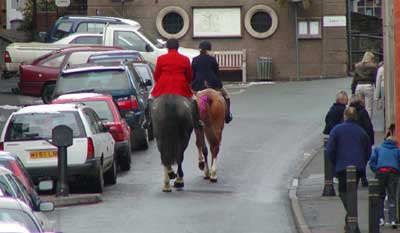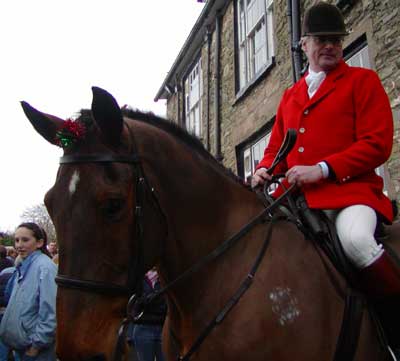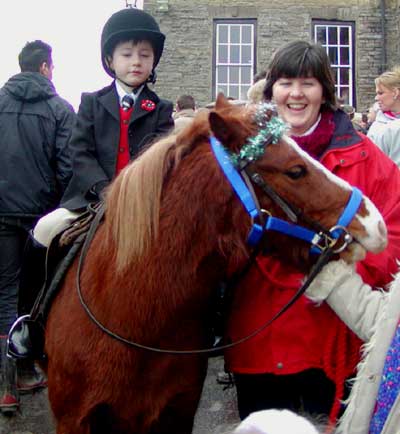


 
 
 
 Photo Essay: Fox and HoundFirst posted in January, 2005 Photo Essay: Fox and HoundFirst posted in January, 2005
Today's Guardian carries the headline Court backs hunting ban. This reminded me of yet another photo essay upon which I have been negligent: I have been meaning to write about the Boxing Day Hunt.
On December 27th, we woke to persistent snow on the ground from the white Christmas of two days before, and got it in our heads that perhaps we should go sledding (or sledging, as it's called here in the United Kingdom). Problem the first: no sled. We phoned Sam's friend Adam, who we knew had not one, but two sleds, and to whom we had already tentatively spoken about a snowy outing.
"Can't until later this afternoon. It's the Boxing Day Hunt." Adam informed us that he was going to gather in the parking lot of the Castle Hotel with the rest of the town for the ceremonial start of the hunt.
Normally this would have transpired on Boxing Day proper, but the weekend had bungled things up a bit, and I had consequently forgotten entirely about the hunt. Despite the early hour and Sam's insistent protestations, I drug him out the door, down the lane, into town, and up the High Street of Bishop's Castle.
We were right on time.
I'm not going to wax on poetically about how I approve of certain types of hunting and disapprove of other sorts, but I'll come right out and say that, on this issue, I side with the majority (two-thirds, I've been told) of the British public in supporting a ban on fox hunting. The fox are hunted with hounds (I'm generally against the rather unsportsmanlike practice of running any wild animal with a dog), followed by huntsmen and huntswomen on horseback.
Most of the town turned up for the ceremonial kick off to the boxing day hunt, but this was mostly to see who would show up in their riding clothes. Perhaps unsurprisingly, the people on horseback are people that folks in Bishop's Castle rarely if ever see in town. Some are members of the reclusive and diminutive upper class, while others weren't from Bishop's Castle at all, but rather from neighboring towns. Hunting in Britain has roots firmly planted in the aristocracy of olde, and, as much as it's been made out as of late to be everyone's sport, it remains to be a pastime of the upper class.
Unfortunately, those in support of the hunt probably misinterpreted the turn out as a rallying of support against the hunting ban, which is set to take effect on February 18th. This might well be the last Boxing Day Hunt of its kind in Bishop's Castle, but not if the Countryside Alliance has anything to say about it. They were passing the hat through the crowd in an attempt to solicit donations for the legal fight that lies ahead. I was not shocked to see the hat was empty. If the rich want to fight for their right to chase down foxes, let them support the legal challenge on their own dime (or ten pence, as the case may be).
I've heard that elsewhere in Europe, there are more humane hunts of which I whole heartedly approve: instead of any sort of wild animal, the dogs chase down a scent, spread by a person with a head start, hoping in the end that the dogs locate the hidden bag that was used to make the trail. Such a hunt would, I think, be just as much fun, most certainly more sporting, and the tradition of meeting at the top of the High Street for the pre-hunt ceremony could persist, with all its pomp and circumstance.
On a final note, the weather took a turn for the worse later in the day. The sledding never materialized, nor did the hunt (or so I was told). After their gathering at the Castle parking lot, everyone simply dispersed and went home.
...
For my own reference, the aforementioned article:
| Court backs hunting ban
Mark Oliver and agencies
Friday January 28, 2005
Guardian Unlimited
The Countryside Alliance today lost its first legal challenge to overturn the impending ban on hunting with dogs, but pledged to continue fighting legal battles in the months ahead.
The pro-hunt group had not expected to win the case but said there would be more legal challenges, including an appeal, and defiantly urged the hunting community to "keep hunting, keep fighting".
The Countryside Alliance had tried to persuade two high court judges this week that the government's use of the rarely-invoked Parliament Act 1949 to push its Hunting Act through parliament in November was illegal.
In a judgment handed down today, Lord Justice Maurice Kay and Mr Justice Collins said that the 1949 Act was "clear, unambiguous and lawful" and that the ban itself was valid.
The chairman of the League Against Cruel Sports, barrister John Cooper, described the judgment as "a great day for Parliamentary democracy".
He said: "The elected House of Commons has 10 times voted overwhelmingly for a ban on the cruelty of hunting with dogs and each time the ban - supported by three-quarters of the British public - was blocked by the unelected House of Lords." The Countryside Alliance, however, welcomed the fact that the judges had given them permission to appeal to the court of appeal because of the importance of the issue. A hearing was fixed for February 8 - just 10 days before the Hunting Act is due to come into force on February 18.
Lord Justice Kay said: "It is common knowledge this legislation concerns great controversy, not only in Parliament but in the country."
Outside court, the chief executive of the Countryside Alliance, Simon Hart, urged hunt followers all over the country not to give up hope, saying: "This is the first of three rounds ... we go to the court of appeal confident we have a very good case."
A third round would be an appeal to the law lords, who are expected to make the final ruling on the Parliament Act issue.
The campaign group said a new legal challenge would be launched next week based on human rights grounds, which could go all the way to the European court of human rights in Strasbourg.
The group is also considering seeking injunctions to prevent the hunting ban coming into force until the whole legal process is exhausted.
If that happens it would be up to the court to decide whether or not to grant the injunction on the Hunting Act, which will ban all hunting with dogs in England and Wales and end a sport that has been practised for almost 700 years but which opponents argue is cruel.
The government has said it is neutral as to whether an injunction should be granted - a position that has angered anti-hunt campaigners who claim the government is keen to avoid conflict on the issue during a general election, expected in May.
In November, the Speaker of the Commons was forced to invoke the Parliament Act to assert the ascendancy of the Commons after the House of Lords twice rejected the Hunting Act.
The Lords rejected a compromise deal that would have meant the ban would have been delayed until July 2006.
The Countryside Alliance's challenge to the Parliament Act rested on the claim that, whereas a two-year delay under which peers could block but not veto a bill had been agreed by the Lords and Commons in 1911, the reduction of the delay to one year by the Labour government of 1949 had not been endorsed by peers.
That claim had never been tested in the courts before even though the act has been used to pass four laws in defiance of the House of Lords.
On Tuesday, Sir Sydney Kentridge QC, for the Countryside Alliance, began the case by telling the high court that the legislation was "not truly an act of Parliament", and that the ban was therefore invalid.
However, the attorney general, Lord Goldsmith, insisted that it was the "law of the land" and there was "no doubt" that the 1949 Act had been passed in accordance with the correct procedures under the 1911 Parliament Act.
Commenting on today's decision by the high court, the RSPCA's director of animal welfare promotion, John Rolls, said: "This challenge was always doomed to failure. Both the Hunting Act 2004 and the Parliament Act 1949 are pieces of primary legislation, validly passed by Parliament - the highest authority in the land - over which the court has no jurisdiction to interfere.
"So, despite this latest diversion from the Countryside Alliance, we look forward to the ban on their barbaric sport coming into force, as expected, on February 18."
However Labour peer and keen huntswoman Lady Mallalieu said: "If the court was right today, then it has the most enormous constitutional implications for everybody."
Lady Mallalieu, who is also the president of the Countryside Alliance, said: "What it means is that the House of Commons can pass legislation to destroy any constitutional power of the House of Lords." |
...
[ TOP OF THIS PAGE | MORE PHOTOGRAPHY | MORE WRITING | HOME ]


|








